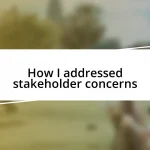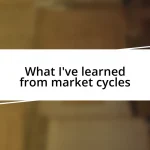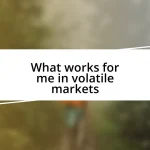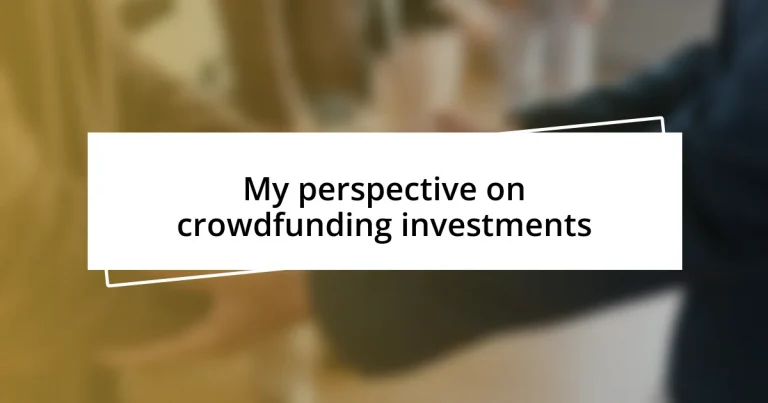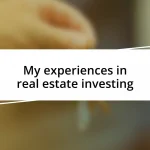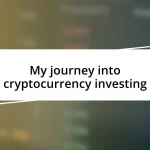Key takeaways:
- Crowdfunding fosters community engagement, allowing individuals to support innovative projects and feel a sense of ownership in their success.
- Investors must evaluate crowdfunding opportunities carefully by assessing platform credibility, project details, and potential risks to make informed decisions.
- Future trends in crowdfunding include technology integration for transparency, a focus on impact investing, and the democratization of investment opportunities, making it more accessible to a broader audience.
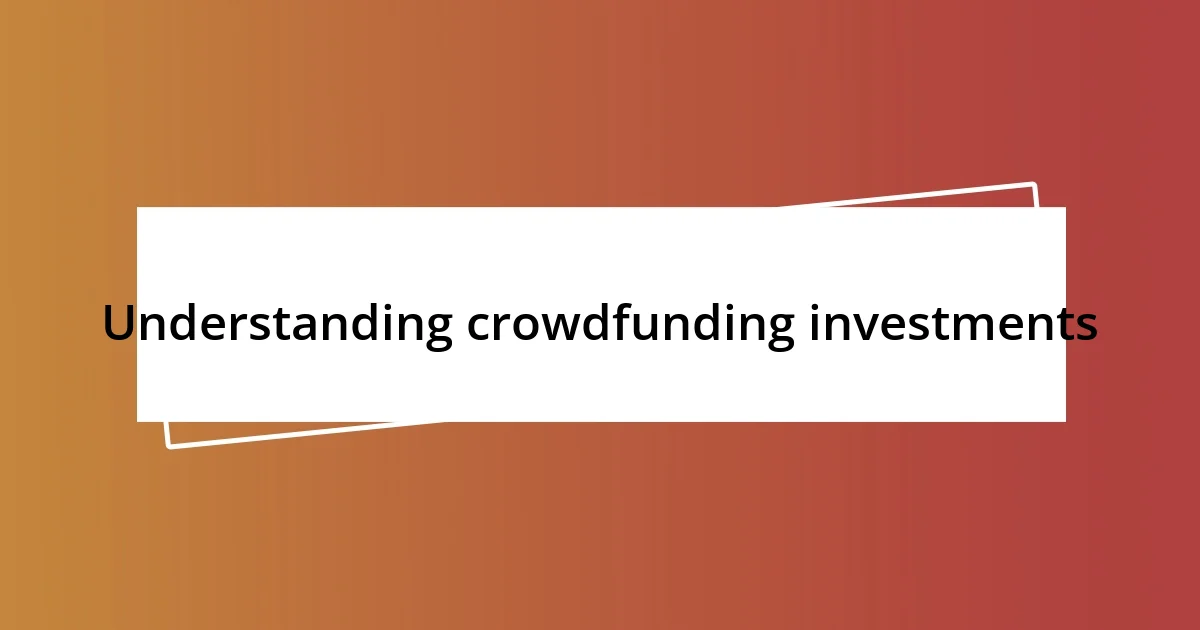
Understanding crowdfunding investments
Crowdfunding investments have become a fascinating avenue for both entrepreneurs and everyday investors alike. I remember the excitement of participating in my first crowdfunding campaign, watching not just my funds but the passion of a community come together to back a promising project. It felt like being part of something bigger, a shared dream.
In essence, crowdfunding allows individuals to pool resources for a variety of ventures, from innovative startups to impactful social causes. Doesn’t it make you wonder how many groundbreaking ideas owe their success to the collective support of backers? This sense of community investment can spark not only financial returns but also personal pride in contributing to the success of someone’s vision.
It’s crucial to understand that crowdfunding isn’t without risks. I’ve learned this firsthand; backing a project can lead to disappointment if it doesn’t deliver as promised. But, isn’t that the allure of entrepreneurship? The potential for both significant gains and valuable lessons keeps the crowdfunding landscape both exciting and unpredictable.
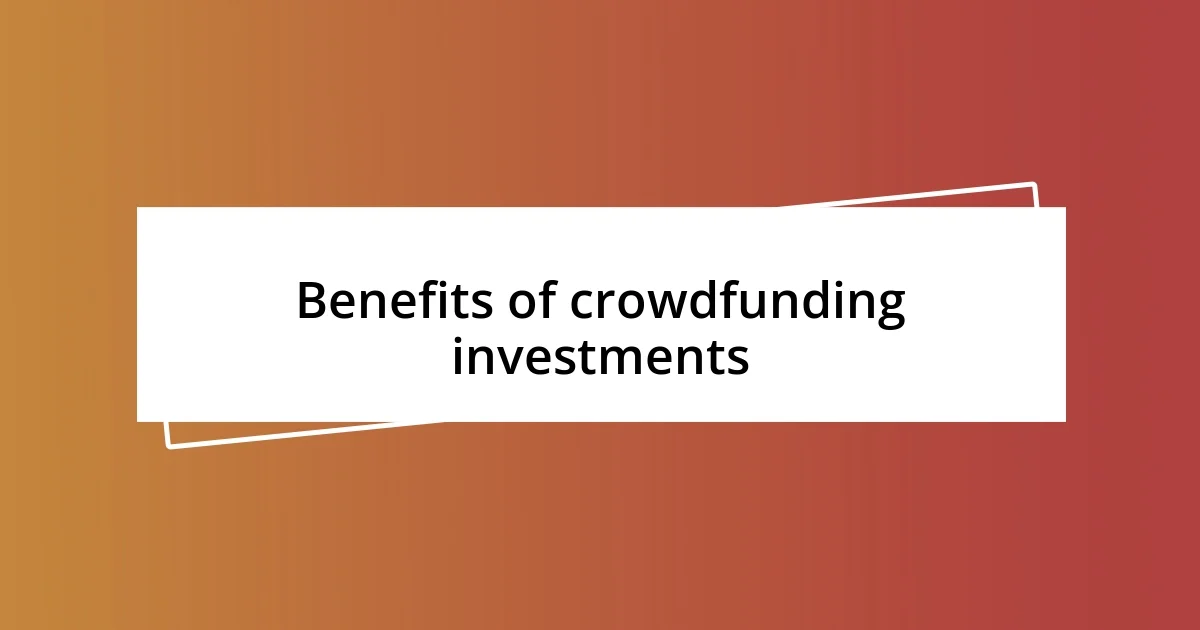
Benefits of crowdfunding investments
The benefits of crowdfunding investments are both varied and compelling. One of the most significant advantages I’ve noticed is the ability to support innovation directly. When I backed a small tech startup, I felt a sense of ownership over its success. Watching my investment help bring a unique product to market was thrilling. It’s like being a silent partner in someone’s dream.
Crowdfunding also democratizes the investment landscape. Traditionally, high-stake investments were often reserved for the wealthy elite. However, platforms today enable anyone to participate in funding opportunities, which I find incredibly empowering. This access means that even those with modest means can contribute to and be part of game-changing projects, fostering diversity in entrepreneurial ventures.
Moreover, participating in crowdfunding allows me to tap into a world of like-minded individuals who share similar interests. For instance, the community spirit during a successful campaign I joined was infectious; every update brought excitement. This connection can lead to networking opportunities that might not be available through conventional investment channels, highlighting one of the intangible yet invaluable benefits of crowdfunding.
| Benefit | Description |
|---|---|
| Support for Innovation | Investors can directly aid in bringing new ideas to life, fostering creativity. |
| Democratization of Investment | Allows a broader group of people to engage in potentially lucrative opportunities. |
| Community Building | Connect with like-minded investors and entrepreneurs, enhancing networking possibilities. |
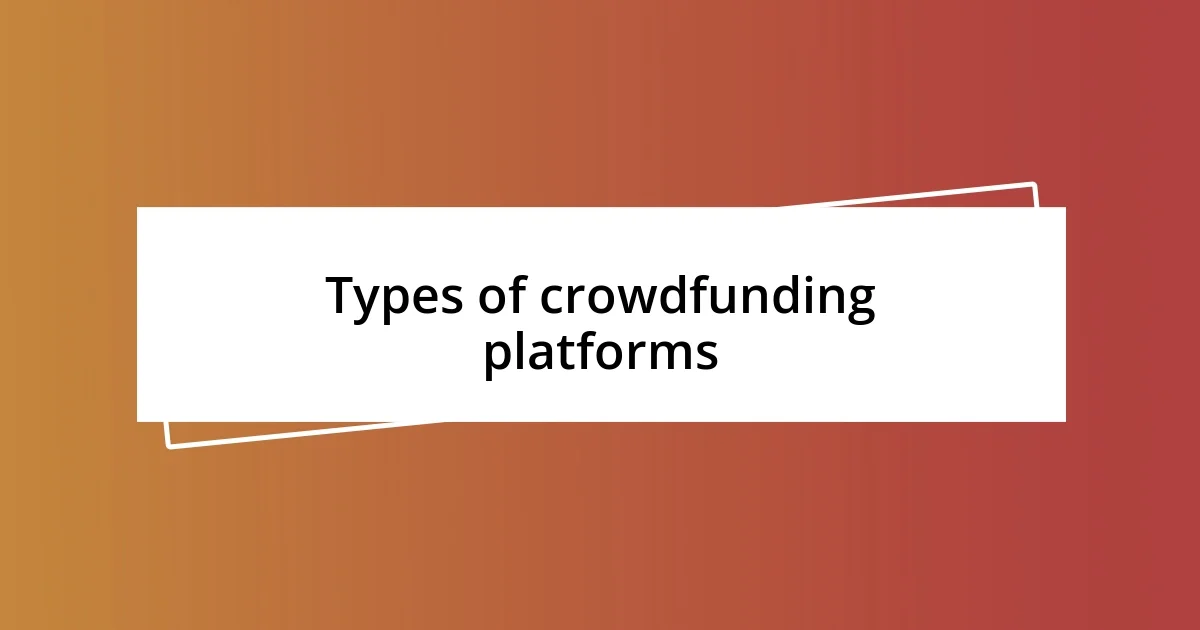
Types of crowdfunding platforms
The variety of crowdfunding platforms available today reflects the diverse needs and goals of both investors and project creators. I’ve seen firsthand how each platform caters to specific types of projects, whether they’re artistic endeavors or innovative products. For instance, I once supported a creative campaign on a platform dedicated solely to artists and musicians. It made me feel directly connected to the project, knowing I was helping fund someone’s creative vision.
Here’s a breakdown of key types of crowdfunding platforms:
-
Reward-based crowdfunding: Backers receive non-financial rewards, like early product access or exclusive merchandise. I remember the thrill of receiving a special edition item from a campaign I supported!
-
Equity crowdfunding: Investors receive shares in the company. This was a game-changer for me, as it felt like being part of the company’s journey rather than just a spectator.
-
Debt crowdfunding: Also known as peer-to-peer lending, backers lend money with the expectation of repayment with interest. I once lent to a small business; the financial return felt satisfying, knowing I helped keep the lights on.
-
Donation-based crowdfunding: Individuals contribute to causes or charities without expecting anything in return. Participating in a campaign to support a community project warmed my heart—it was a beautiful reminder of the impact collective generosity can have.
Each platform offers unique opportunities, and my experiences have shown me just how varied and meaningful crowdfunding can be.
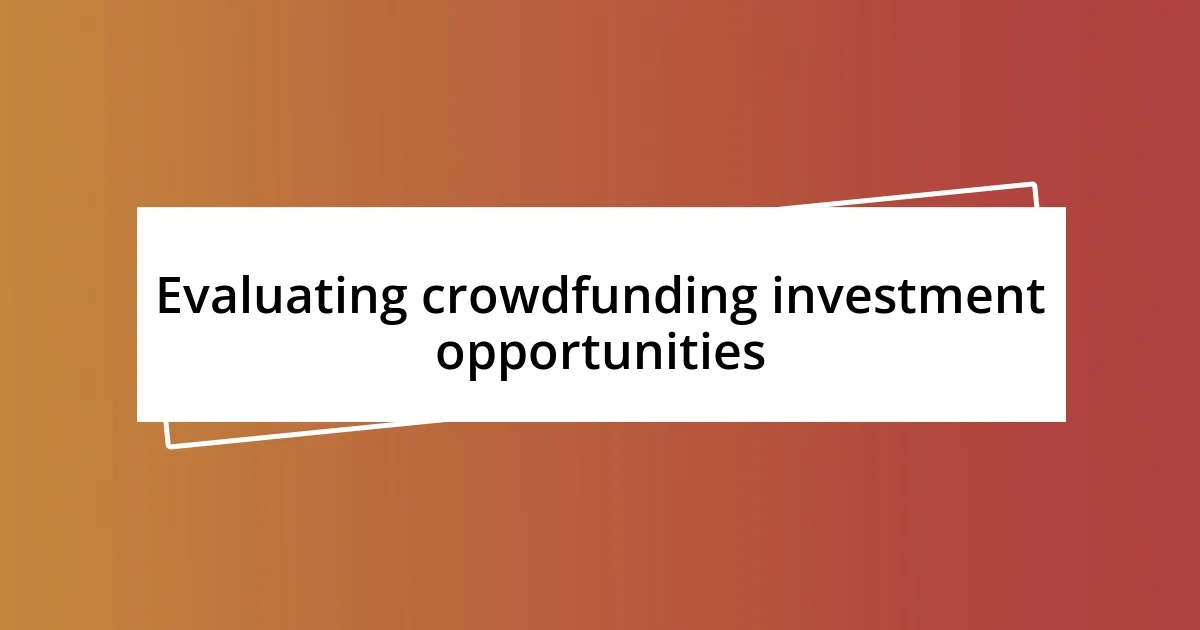
Evaluating crowdfunding investment opportunities
Evaluating crowdfunding investments is essential to ensuring that your hard-earned money supports worthwhile projects. I always start by examining the credibility of the platform itself. For instance, choosing a platform with a solid reputation can make a significant difference. I once invested on a lesser-known site and learned the hard way that not all platforms vet projects thoroughly. Lesson learned: always look for reviews or feedback from previous investors.
Beyond the platform, I delve into the project details. Scrutinizing the business model and the team’s background often reveals crucial insights. I vividly recall analyzing one startup’s pitch, only to find the team lacked relevant experience. It raised a red flag for me; how could I trust they’d navigate challenges successfully? If you can’t believe in the people behind the idea, how can you invest with confidence?
Finally, I assess the projected returns versus the risks involved. Looking back at my crowdfunding journey, I remember an investment that promised substantial returns, but the timeline felt overly optimistic. Understanding the market dynamics is vital—after all, I want my investment to grow, not dwindle. Conducting this analysis helped me develop a keen sense of what to look for, increasing my chances of making informed decisions that align with my financial goals.
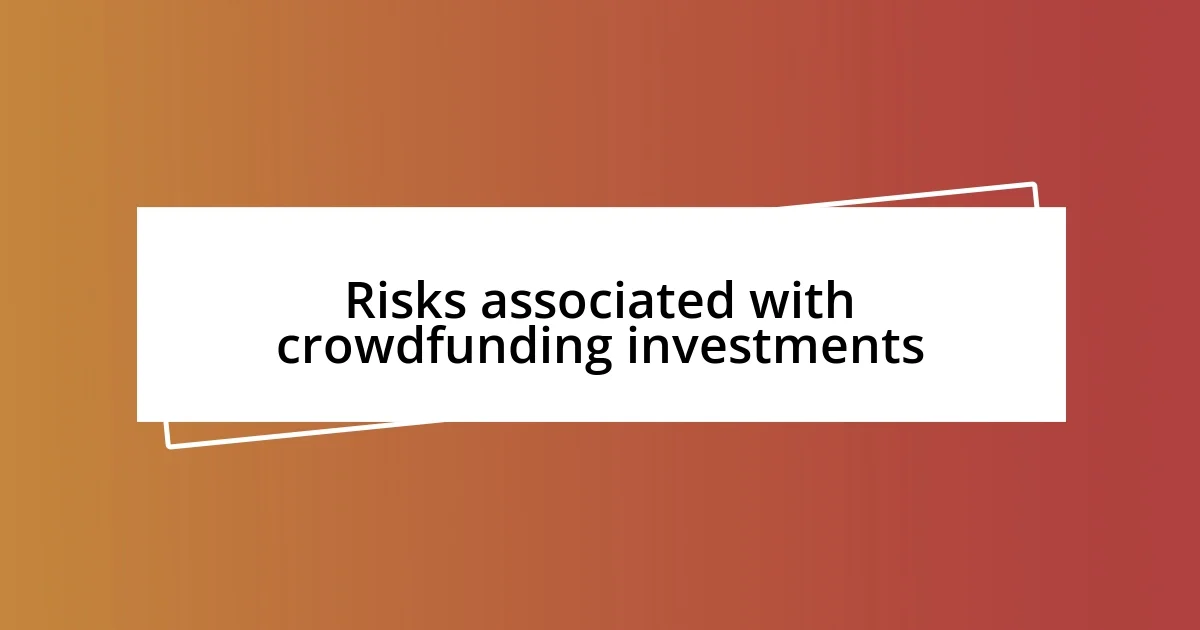
Risks associated with crowdfunding investments
Investing in crowdfunding does come with its share of risks, and I’ve experienced a few of these myself. One glaring concern is project failure. I once backed a tech startup that seemed promising, but after a few months, their updates dwindled, and eventually, they declared bankruptcy. It was disheartening to see my investment vanish with no return. How often do we invest in dreams without considering the harsh reality that not every idea will succeed?
Another significant risk is lack of oversight. Unlike traditional investments, crowdfunding doesn’t always have the same stringent regulations. I remember feeling a wave of apprehension after backing a campaign without fully verifying the team’s credentials. It made me question the integrity of these platforms. I had to ask myself—how well can I really trust a project that doesn’t have the support of a seasoned oversight body?
Market volatility also looms large in the crowdfunding space. I reflected on a real estate crowdfunding opportunity that seemed golden at first. However, as external market conditions shifted, my investment began to feel less secure. It was a poignant reminder that the market can turn on a dime. So, my advice is to always anticipate fluctuations and prepare yourself emotionally—because the ride can be quite bumpy.
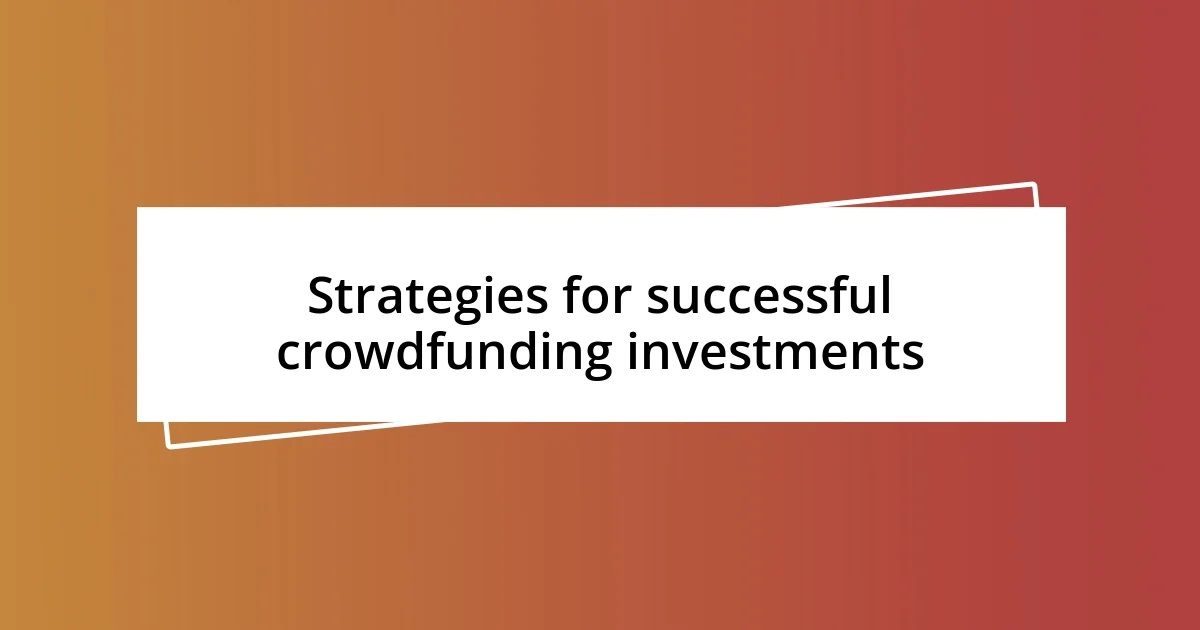
Strategies for successful crowdfunding investments
When considering strategies for successful crowdfunding investments, I always prioritize diversifying my portfolio. It’s similar to not putting all my eggs in one basket. I learned this the hard way when I invested heavily in a single project that failed miserably. Now, I spread my investments across several projects, which not only cushions potential losses but also opens up the potential for discovering great opportunities in different sectors.
Additionally, I’ve found that engaging with the community around a project can provide invaluable insights. Participating in discussions and asking questions helps me gauge the overall sentiment and viability of a project. I remember joining an online forum dedicated to a crowdfunding campaign I was interested in. The conversations revealed genuine concerns about the project’s timeline and execution, shifting my perspective and ultimately leading me to withdraw my support. Have you ever noticed how much other investors can influence your own decisions?
Lastly, I advocate for regular follow-ups after making an investment. I believe it’s essential to stay informed by monitoring updates and being proactive in communication with project leaders. There was a time when I passively waited for news, and it left me feeling anxious and disconnected. Now, I make it a point to check in and ask pertinent questions. Being engaged not only alleviates uncertainty but also shows the project team that investors care, fostering a sense of accountability on their end.
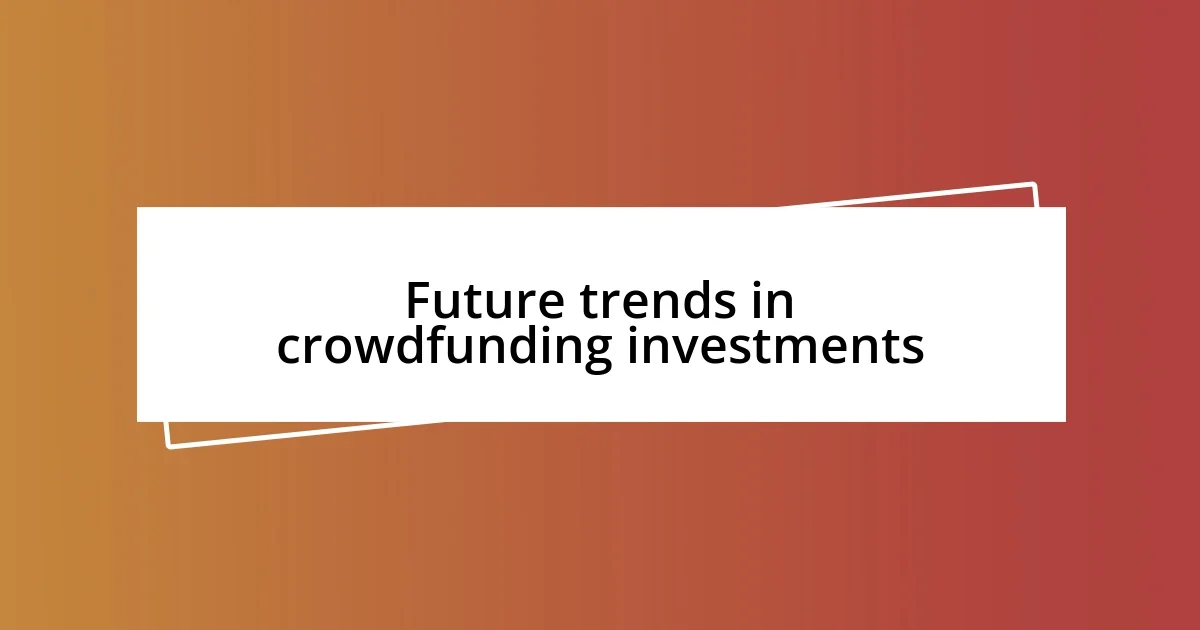
Future trends in crowdfunding investments
As I look towards the future of crowdfunding investments, I can’t help but feel intrigued by the rise of technology integration in this space. With advancements in blockchain and artificial intelligence, projects are becoming more transparent and accessible than ever. I remember the thrill of engaging with a crowdfunding platform that utilized blockchain for tracking investments. It felt like I was part of something revolutionary, ensuring that every dollar spent was accounted for. How exciting is it to think that issues like fraud could be minimized through secure, transparent systems?
Another trend that’s hard to ignore is the growing emphasis on impact investing. There’s been a marked shift towards projects that not only aim for financial returns but also promise social or environmental benefits. I once backed a renewable energy initiative that resonated deeply with my values. Witnessing the project’s impact on the community reinforced my belief that investments can foster real change. It raises the question—what kind of legacy do I want my investments to leave behind?
I also believe that the future will see more democratization in who can invest. Regulations are slowly evolving, allowing a broader range of individuals to access opportunities that were once limited to wealthy investors. I recall feeling a wave of excitement when a platform I used announced they were opening up funding to non- accredited investors. It made me feel empowered, knowing that anyone could support innovative ideas. Is it possible that crowdfunding will reshape the traditional investment landscape, making it more inclusive and diverse? That thought certainly makes me optimistic about what lies ahead in this dynamic field.








